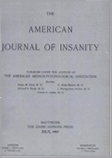Abstract
1. Mental deficiency seems to be consistently more common in the male than in the female sex.
2. This is most strikingly shown in opposite-sex twins. Among 27 pairs of opposite-sex twins, both had mental deficiency in 11 instances, the male alone in 11 instances, and the female alone in 5 instances.
3. It appears in a similarly consistent way that girls make a slightly better showing than boys in intelligence tests and in scholastic record.
4. These facts suggest that gene factors of intelligence may in some cases be carried in the X-chromosomes and not only in the autosomes; or, in other words, that there may be a sex-linked factor in some cases in the genetic history of mental deficiency and of general intelligence.
5. In order to make the simplest provision in biological symbols and formulas for a sex-linked factor, it is necessary to assume the existence of six possible types of males, nine types of females, and 54 types of mating.
6. Theoretically, from 38 of these types of mating only normal offspring can result.
7. The mentally deficient offspring that may result from eight other types of mating may be expected to be eqaully distributed in the two sexes, as far as the possible influence of any sex-linked factor is concerned.
8. Only male mentally deficient offspring can result from the remaining eight types of mating.
9. Among phenotypes it is, of course, impossible to distinguish the various genotypes represented in the symbols and formulas listed in this paper. However, it may be readily deduced from the formulas that when both parents are mentally deficient or when the father alone is mentally deficient, an equal distribution of mental deficiency in the two sexes of offspring may be expected. When both parents are normal or when the mother alone is mentally deficient, then, too, mentally deficient offspring of both sexes may result; but their distribution will not be equal in the two sexes, for the cases in which a sex-linked factor may be operative will be included in this part of the material. Here, according to theory, any relative excess of mental deficiency in the male sex must be, at least in part, attributed to a sex-linked factor.
10. A re-investigation of a part of Goddard's published material, selected by reason of relevancy to the questions raised in this contribution, bears out the assumption of a sex-linked factor in the genetic history of mental deficiency. The general relative excess of mental deficiency in the male sex is, however, greater than can be accounted for by this factor; to some extent it must be attributed to some other factor or factors.

